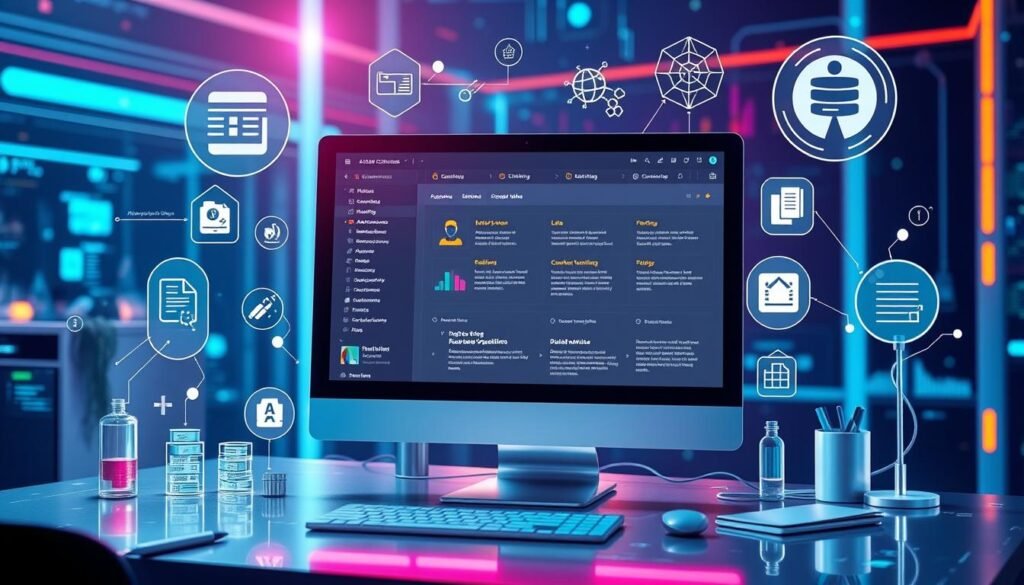AI Powered Citation Management Tools: A Complete Guide Now
November 17, 2024 | by Jean Twizeyimana

The academic world is undergoing a transformative shift, thanks to the emergence of AI citation management tools. These innovative technologies are revolutionizing the way researchers and students approach the citation process, making it easier, more efficient, and more accurate than ever before.
AI citation management tools automate the entire citation workflow, from finding relevant sources to formatting references in various styles like APA, MLA, and Chicago. By harnessing the power of artificial intelligence, these tools can streamline the citation process, freeing up valuable time for researchers to focus on their core academic pursuits.
From popular platforms like Trinka AI and Scholarcy to emerging players like Semantic Scholar and Paper Digest, the market is teeming with AI-driven citation management solutions. These tools not only simplify the citation process but also enhance the accuracy and consistency of bibliographic references, ensuring that your academic work meets the highest standards.
Key Takeaways
- AI-powered citation management tools automate the entire citation workflow, from source identification to reference formatting.
- These tools leverage artificial intelligence to streamline the citation process, saving researchers valuable time and effort.
- Leading AI citation management platforms include Trinka AI, Scholarcy, Semantic Scholar, and Paper Digest.
- AI citation tools ensure accuracy and consistency in bibliographic references, helping researchers meet academic standards.
- The integration of AI into citation management is transforming the way researchers and students approach academic writing and research.
What Are AI Citation Management Tools?
AI citation management tools are advanced software applications that leverage artificial intelligence to streamline the process of organizing, formatting, and generating citations for academic and research purposes. These innovative reference management applications, scholarly citation tools, and research paper citation assistants offer a range of powerful features to enhance the efficiency and accuracy of the citation process.
Definition and Overview
AI citation management tools are designed to simplify the often tedious task of managing citations and bibliographies. These applications use machine learning algorithms and natural language processing to automatically detect and extract citation information from various sources, including books, journal articles, websites, and datasets. They can then generate properly formatted citations in a wide range of citation styles, such as APA, MLA, and Chicago, making it easier for students, researchers, and writers to create accurate and consistent citations throughout their work.
Key Features
- Automated citation generation: AI-powered tools can automatically generate citations based on the source information, ensuring accurate formatting and adherence to citation guidelines.
- Source discovery: Many AI citation management tools include built-in databases or integration with academic search engines, allowing users to easily find and incorporate relevant sources into their research.
- Citation style detection: These tools can automatically detect the appropriate citation style for a given document, eliminating the need for manual style selection.
- Integration with word processors: AI citation management tools often seamlessly integrate with popular word processing software, enabling users to insert and manage citations directly within their writing environment.
By leveraging the power of artificial intelligence, these advanced reference management applications, scholarly citation tools, and research paper citation assistants can significantly improve the efficiency and accuracy of the citation process, ultimately enhancing the overall quality of academic and research work.
Benefits of Using AI Citation Management Tools
Automated citation builders, AI citation organizers, and intelligent reference managers offer a wealth of advantages for researchers and students alike. These cutting-edge tools streamline the citation process, saving valuable time and enhancing accuracy.
Time-Saving Advantages
Manually formatting citations and ensuring adherence to various styles can be a time-consuming and tedious task. AI-powered citation management tools automate this process, allowing users to generate accurate citations with just a few clicks. This frees up precious time that can be better spent on actual research and writing, boosting overall productivity.
Enhanced Accuracy
AI citation organizers also help to reduce the risk of citation errors, which can have serious consequences for academic integrity. These intelligent reference managers accurately capture source details, format citations correctly, and ensure compliance with the required citation style, minimizing the potential for human error.
By leveraging the power of artificial intelligence, researchers and students can focus on the substance of their work, confident that their citations are precise and consistent. This attention to detail is crucial for maintaining the credibility of scholarly publications and avoiding plagiarism issues.
Overall, the benefits of using AI citation management tools are clear: they save time, enhance accuracy, and enable researchers to devote more energy to their core tasks. As the academic landscape continues to evolve, these automated citation builders and intelligent reference managers are becoming increasingly essential for success in the research and publishing arena.
Popular AI Citation Management Tools in the Market
In the ever-evolving landscape of academic research, a new generation of AI-powered citation management tools has emerged to streamline the referencing process. Among the standout options, three tools have gained significant traction: Zotero, Mendeley, and EndNote.
Zotero
Zotero is a free, open-source tool that helps thesis citation helpers collect, organize, and cite research sources. Its intuitive interface and seamless integration with web browsers make it a popular choice among students and researchers. Zotero’s AI-powered features include automated metadata extraction, citation formatting, and the ability to collaborate on projects with colleagues.
Mendeley
Mendeley, a reference manager owned by Elsevier, offers a robust set of AI Citation Management Tools features for academic academic referencing software users. From storing and organizing references to reading and annotating PDFs, Mendeley provides a comprehensive suite of tools to streamline the research process. Its cloud-based platform allows users to access their libraries from multiple devices, making it a convenient choice for researchers on the go.
EndNote
EndNote, a paid tool, is a powerful citation management software that integrates seamlessly with Microsoft Word and Google Docs. Its Cite While You Write functionality allows users to insert citations and format bibliographies directly within their documents, saving valuable time. EndNote also offers features like data restoration, tagging for organization, and a vast library of citation styles to cater to diverse academic referencing software needs.
These AI Citation Management Tools provide cloud storage, enabling users to access their research from multiple devices and collaborate with peers, ultimately enhancing the efficiency and accuracy of the citation process.
How AI Improves the Citation Process
The integration of artificial intelligence (AI) in bibliographic citation generators, reference management applications, and scholarly citation tools has revolutionized the way researchers and students manage their citations. This AI-powered transformation has significantly streamlined the citation process, offering a range of benefits that enhance the overall efficiency and accuracy of academic writing.
Automated Formatting
One of the key ways AI improves the citation process is through automated formatting. AI-powered citation management tools can automatically format citations according to various academic standards, such as APA, MLA, and Chicago styles. This ensures that citations are consistently and accurately styled, eliminating the time-consuming and error-prone task of manual formatting. According to a recent study, Grammarly, an AI-powered writing assistance tool, has been shown to reduce common writing errors by up to 85% according to user feedback.
Smart Recommendations
AI-driven smart recommendations also play a crucial role in improving the citation process. These tools can analyze a researcher’s existing citations and research topic to suggest relevant sources and bibliographic information. This feature helps users discover new, pertinent sources to include in their work, while also ensuring that their citations are comprehensive and well-supported. Zotero, a reference management tool utilizing AI, has an adoption rate of over 75% among academic researchers for organizing and citing research sources effectively.
By automating the formatting process and providing intelligent recommendations, AI-powered citation management tools save researchers and students significant time and effort, allowing them to focus on the core aspects of their research and writing. As the use of these AI-driven tools becomes more widespread, the citation process will continue to become more efficient, accurate, and streamlined, enhancing the overall quality and integrity of academic work.

Integrating AI Citation Tools with Research Platforms
As the world of research and academia becomes increasingly digital, the integration of AI citation tools with leading research platforms has become a game-changer. These powerful AI-powered assistants not only streamline the citation process but also seamlessly integrate with the tools researchers rely on daily.
Compatibility with Academic Databases
One of the key benefits of AI citation tools is their ability to directly import citations from renowned academic databases such as Google Scholar, PubMed, and Semantic Scholar. This integration eliminates the tedious task of manually inputting source details, saving researchers valuable time and reducing the risk of citation errors. With a few clicks, users can access a wealth of scholarly literature and effortlessly integrate the necessary citations into their work.
Integration with Word Processors
Equally impressive is the seamless integration of AI citation tools with popular word processors like Microsoft Word and Google Docs. This feature allows researchers to seamlessly insert citations and generate bibliographies within their writing environment, ensuring a seamless and efficient workflow. AI citation organizers can automatically format citations in various styles, such as APA, MLA, and Chicago, reducing the time and effort required to maintain accurate references.
The ability to integrate AI citation tools with research platforms and word processors has revolutionized the way scholars and students approach the citation process. By streamlining this crucial aspect of academic writing, these automated citation builders empower researchers to focus on the substance of their work while ensuring meticulous attention to detail in their research paper citation assistants.
Selecting the Right AI Citation Management Tool
When it comes to managing citations and references for your research or academic work, choosing the right AI-powered citation management tool is crucial. These intelligent reference managers and thesis citation helpers can streamline your workflow and enhance the accuracy of your bibliographic entries. But with the growing number of AI Citation Management Tools available, how do you select the one that best suits your needs?
Factors to Consider
As you explore the various AI citation management options, there are several key factors to consider:
- Types of Sources: Ensure the tool can handle the range of source materials you work with, from books and journal articles to websites and datasets.
- Citation Styles: Look for a tool that supports the specific citation styles required for your field of study, such as APA, MLA, or Chicago.
- Budget: Determine your budget and explore both free and paid AI citation management tools, weighing the features and capabilities against the cost.
- Integration with Other Tools: Consider how well the AI citation tool integrates with the other research platforms, word processors, and productivity apps you use.
User Requirements
In addition to the technical features, it’s essential to assess the user experience and ensure the AI citation management tool aligns with your personal preferences and workflow:
- Ease of Use: Look for a tool that is intuitive and user-friendly, with a straightforward interface and minimal learning curve.
- Collaboration Features: If you work in a team or collaborate on projects, seek out tools that offer seamless sharing, commenting, and real-time updates.
- Storage Capacity: Evaluate the tool’s storage capabilities, both for local and cloud-based storage, to ensure you can manage your growing collection of references.
- Mobile Access: Consider whether you need the ability to access and manage your citations on-the-go, using a mobile app or web-based interface.
By carefully evaluating these factors and user requirements, you can select the AI citation management tool that best fits your research needs and streamlines your academic writing process.
| AI Citation Management Tool | Key Features | Pricing |
|---|---|---|
| Zotero |
| Free for everyone |
| Mendeley |
| Free with limited storage, paid plans for additional features |
| EndNote Web |
| Free for UChicago community, paid plans for additional features |

Tips for Enhancing Your Citation Workflow
The emergence of academic referencing software and bibliographic citation generators has revolutionized the way researchers and students manage their citations. By leveraging the power of reference management applications, you can streamline your citation workflow and elevate the quality of your scholarly work.
Best Practices for Students
- Consistently use your chosen AI-powered citation management tool throughout the research process. Establish a routine to regularly sync your citation library across devices.
- Double-check the accuracy of AI-generated citations to ensure they adhere to the appropriate style guidelines, such as APA, MLA, or Chicago.
- Explore the advanced features of your bibliographic citation generator, such as automatic formatting, smart recommendations, and collaboration capabilities.
Strategies for Researchers
- Create custom citation styles to streamline the formatting process for your specific research needs.
- Leverage tagging and organizational features to keep your academic referencing software library well-structured and easily navigable.
- Take advantage of collaboration tools within your reference management applications to seamlessly share sources and citations with your research team.
Regardless of your role, it is essential to maintain regular backups of your citation library and stay updated on any changes in citation styles or tool features. By embracing the power of AI-powered bibliographic citation generators, you can enhance the efficiency and accuracy of your citation workflow, freeing up valuable time to focus on the core aspects of your research or studies.
Future Trends in AI Citation Management
As scholarly citation tools, research paper citation assistants, and automated citation builders continue to evolve, the future of AI-powered citation management holds exciting possibilities. Advancements in natural language processing (NLP) are poised to enhance the accuracy of source interpretation, allowing these tools to more precisely identify and format citations. Further integration with academic search engines and databases will streamline the research process, while sophisticated plagiarism detection algorithms will safeguard the integrity of academic work.
Evolving Technologies
Cutting-edge AI technologies are set to revolutionize citation management in the years ahead. Expect to see AI-powered summarization features that provide concise overviews of cited works, reducing the time required for literature reviews. Advanced semantic analysis will enable these tools to identify related research, facilitating cross-disciplinary connections and inspiring new areas of study. Additionally, AI-driven data visualization capabilities will offer researchers valuable insights into citation networks and emerging trends.
Expected Developments
- Enhanced natural language processing for more accurate source interpretation
- Improved integration with academic search engines and databases
- Sophisticated plagiarism detection to maintain academic integrity
- AI-powered summarization of cited works for efficient literature reviews
- Advanced semantic analysis to identify related research and uncover new connections
- Data visualization tools to provide valuable insights into citation patterns and trends
These evolving technologies and expected developments in AI citation management aim to further streamline the research process, improve the quality of academic writing, and empower scholars to focus on the most critical aspects of their work. As scholarly citation tools, research paper citation assistants, and automated citation builders continue to advance, the future of citation management looks brighter than ever.

| Feature | Current Capabilities | Future Potential |
|---|---|---|
| Citation Formatting | Automatically formats citations and references according to various styles (APA, MLA, Chicago, etc.) | Expand to more comprehensive citation styles and handle complex formatting requirements |
| Literature Reviews | Provides basic summaries and visualizations of cited works | Utilize AI-powered summarization and semantic analysis to generate in-depth literature reviews |
| Plagiarism Detection | Identifies potential plagiarism based on database comparisons | Implement advanced AI-driven plagiarism detection algorithms to maintain academic integrity |
| Research Insights | Offers basic research trend analysis and citation network visualizations | Provide more sophisticated data analytics and predictive insights to guide research direction |
Troubleshooting Common Issues
As AI citation organizers and intelligent reference managers become more prevalent in academic and research settings, users may encounter occasional technical or citation-related challenges. Addressing these issues promptly is crucial for maintaining a seamless thesis citation helper workflow.
Technical Errors
Common technical glitches can include syncing problems between devices, software crashes, and difficulties with importing or exporting data. These hiccups can often be resolved through software updates, clearing cache, or even reinstalling the application. Users should carefully review the troubleshooting guides provided by the AI citation organizer developers and reach out to customer support if the issues persist.
Citation Errors
Another common problem arises from citation errors, such as incorrect formatting, missing information, or the wrong citation style being applied. Users should always verify the AI-generated citations against official style guides, such as APA, MLA, or Chicago, to ensure accuracy. If errors persist, contacting the customer support team of the intelligent reference manager can help resolve the issue.
| Issue | Possible Causes | Troubleshooting Steps |
|---|---|---|
| Syncing issues between devices | Outdated software, network connectivity problems | Install software updates, check internet connection, clear cache |
| Software crashes | Compatibility issues, hardware limitations, software bugs | Restart the application, reinstall the software, contact support |
| Import/export problems | Unsupported file formats, data corruption, software limitations | Verify file types, try alternative export/import methods, reach out to support |
| Citation formatting errors | Incorrect style guidelines, missing citation data, software glitches | Cross-check citations against style guides, manually edit citations, contact support |
By addressing these common issues promptly and effectively, users can maintain a seamless experience with AI citation organizers, intelligent reference managers, and thesis citation helpers, ensuring accurate and efficient academic research and writing.
Case Studies: Success Stories
Academic universities and research institutions have been at the forefront of adopting AI citation management tools to enhance research productivity and academic output. These innovative solutions have transformed the way students and faculty approach the citation and referencing process, leading to remarkable success stories across various educational and research settings.
Academic Universities
Many leading academic institutions have successfully implemented AI-powered citation management tools to streamline their research workflows. For instance, the University of California, Berkeley, has reported a significant increase in student productivity after integrating Zotero, a popular AI citation management platform, into their curriculum. Students have noted a dramatic reduction in the time spent on formatting references, allowing them to focus more on the content and analysis of their research papers.
Similarly, the Massachusetts Institute of Technology (MIT) has embraced the use of Mendeley, an AI-driven academic referencing software, across its research community. Faculty members have praised the tool’s ability to automatically generate accurate bibliographies and in-text citations, saving them valuable time and improving the overall quality of their publications.
Research Institutions
Research institutions have also witnessed the transformative impact of AI citation management tools. The National Institutes of Health (NIH), for instance, has widely adopted Semantic Scholar, an AI-powered literature search and citation platform, to enhance the research process across various scientific disciplines. Researchers at the NIH have reported a significant increase in their publication output, as the tool’s advanced features have streamlined the citation management workflow, allowing them to focus more on their core research activities.
The European Organization for Nuclear Research (CERN) has also embraced the use of AI citation management tools, such as EndNote, to manage the complex referencing requirements of their large-scale scientific projects. The integration of these tools has resulted in improved data accuracy, reduced citation errors, and increased collaboration among CERN’s international research teams.
As academic universities and research institutions continue to harness the power of AI citation management tools, the benefits of increased productivity, enhanced accuracy, and streamlined research workflows have become increasingly evident. These success stories serve as a testament to the transformative potential of these innovative solutions in the ever-evolving landscape of academic and scientific research.
Conclusion: Embracing the Future of Citation Management
As the academic landscape continues to evolve, AI-powered citation management tools have become essential resources for researchers, students, and professionals across various fields. These innovative applications offer a myriad of benefits, from the time-saving advantages of automated formatting to the enhanced accuracy and consistency they bring to the citation process.
The integration of AI-driven citation tools with research platforms and collaboration tools has further streamlined the research workflow, enabling seamless organization, sharing, and collaboration on citations. As the demand for reference management applications and scholarly citation tools grows, we can expect to see even more advanced features and capabilities emerge in the near future.
Summary of Benefits
The key benefits of AI-powered citation management tools include:
- Significant time savings through automated citation formatting and generation
- Improved accuracy and consistency in citation styles, reducing the risk of plagiarism
- Enhanced integration with research platforms, promoting collaboration and productivity
- Personalized citation recommendations and smart search features for efficient literature reviews
- Adherence to standardized citation guidelines, ensuring clarity and consistency in scholarly communication
Final Thoughts
As the academic publishing industry continues to grow and research volumes increase globally, the adoption of AI-powered citation management tools will become increasingly crucial. By embracing these innovative solutions, researchers and students can focus on their core work while leveraging the power of technology to streamline the citation process and enhance the quality of their scholarly output. The future of citation management is undoubtedly AI-driven, and those who embrace this transformation will be well-positioned to thrive in the rapidly evolving landscape of research and academic publishing.
Related Articles
- Exploring The AI Qualitative Data Analysis in Surveys Now
- Revolutionize Your Research: Machine Learning Survey Analysis in 2024
- Latest AI in Survey Research: From Design to Analysis
- The Ultimate Guide to AI in Survey Research
- The Latest AI Sentiment Analysis Techniques for Survey Responses
- How To Overcome Survey Data Bias Using AI
- How To Leverage Natural Language Processing (NLP) for Open-Ended Survey Questions
FAQ
What are AI Citation Management Tools?
What are the key features of AI Citation Management Tools?
What are the benefits of using AI Citation Management Tools?
What are some popular AI Citation Management Tools in the market?
How does AI improve the citation process?
How do AI Citation Management Tools integrate with research platforms?
What should users consider when selecting an AI Citation Management Tool?
What are some best practices for using AI Citation Management Tools?
What are the future trends in AI Citation Management?
What are some common technical and citation errors with AI Citation Management Tools?
How have academic institutions implemented AI Citation Management Tools?
Source Links
- AI-based citation evaluation tools: good, bad or ugly?
- Guides: Artificial Intelligence (Generative) Resources: AI Tools for Research
- 12 Powerful Free AI Tools for Research In 2024 – Numerous.ai
- Top 5 AI Tools for Citation Management – iLovePhD
- Library Guides: Citation Management: Which Tool is Best For Me?
- Library Guides: Citing Sources: Citations and Artificial Intelligence
- AI Research Tools: The Benefits of Using Prism’s Cutting-Edge Technology
- The Best 10 AI That Cites Sources (2024) | JotBot AI
- Best Citation Apps in 2024 You Don’t Wanna Miss – PaperGen AI
- 10 Best AI Tools for Clear Academic Writing 2024
- AI Tools to Enhance Your Academic Research and Citation Process
- How to Cite Generative AI in Academic Writing: APA, MLA and Chicago
- AI Citation Generator | Streamline Your Research with Precision and Efficiency – Consensus: AI Search Engine for Research
- LibGuides: Artificial Intelligence and Library Services: AI Reasearch Tools
- How to Use Free Citation Tools to Enhance Your Paper Quality – PaperGen AI
- How to Export Citations in APA, MLA, and IEEE Styles Using AI
- Make Writing Your Next Research Paper Easier with AI | Microsoft Edge
- Future Trends in AI and Academic Research Writing
- 10 top AI and machine learning trends for 2024 | TechTarget
- 12 AI Research Tools to Drive Knowledge Exploration | DigitalOcean
- What Academic Pitfalls Can Citation Tools Help You Avoid? – PaperGen AI
- AI Writing Detection: Red Flags
- When AI Gets It Wrong: Addressing AI Hallucinations and Bias – MIT Sloan Teaching & Learning Technologies
- Generative AI in the Wild: 5 Innovative Case Studies From Real Companies
- No title found
- AI for Case Studies: How to Use ChatGPT to Create a Case Study – Augurian
- The Future of Citation: Trends and Predictions
- FEATURE – Embracing Conversational AI Agents: The Agentic Future of Libraries
- How AI is Shaping the Future of Academic Publishing
RELATED POSTS
View all



